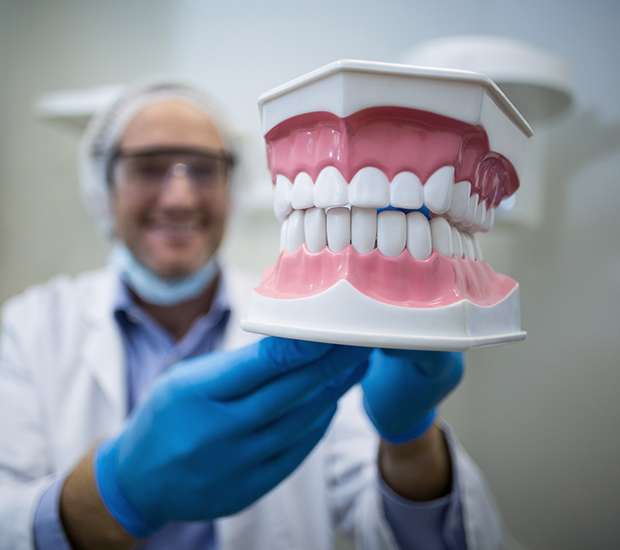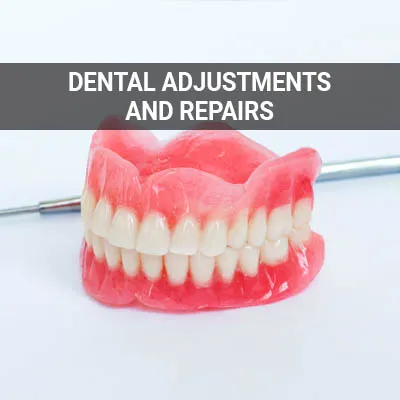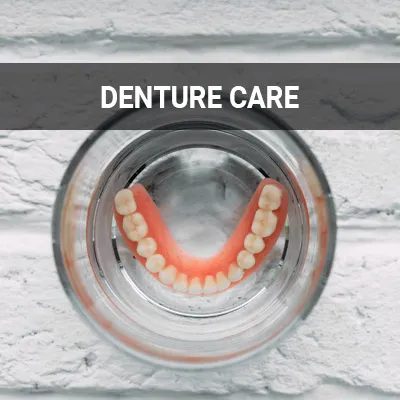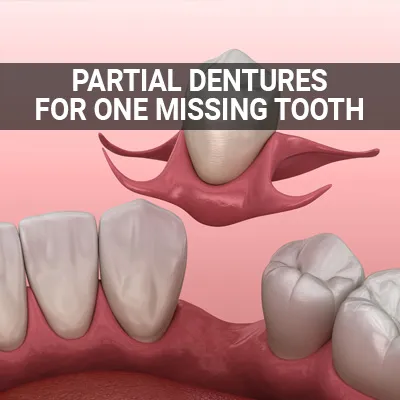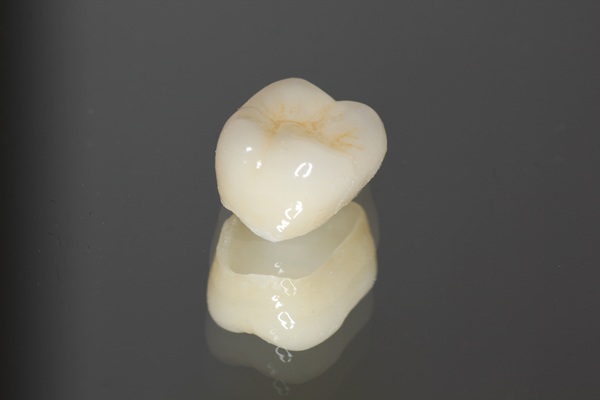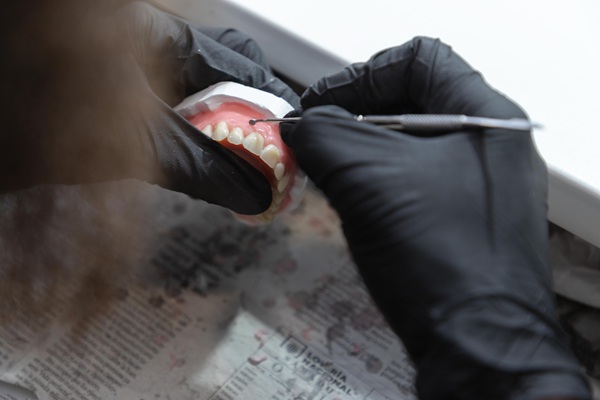Denture Relining Port Allen, LA
Dentures improve the quality of life for many people. Over time, however, dentures may need to be relined or rebased to continue working correctly. Denture relining is the reshaping of the side of the denture that touches a person's gums or the roof of the mouth. Denture rebasing is the complete reconstruction of the base of the denture without replacing the tooth portion.
Denture relining and rebasing is available at GBR Dental in Port Allen and the surrounding area. We work with our patients to determine the ideal process to use when adjusting the fit of dentures. Properly fitting dentures can prevent soreness and oral health problems. Call us today at (225) 298-9980 to schedule an appointment.
How to Tell When Dentures Need to Be Relined or Rebased
You should make a dental appointment any time your dentures feel uncomfortable. Dentures must fit properly, so they do not rub on the gums and create sore spots. Most patients will need to have their dentures adjusted after tooth loss, as reshaping of the gums and jawbone will naturally follow.
The American College of Prosthodontists explains that many patients mask these changes by using denture adhesives to ensure the prosthetics stay in place. However, relining will still be necessary. Denture relining involves adding material to the existing base of the denture (the part that supports the artificial teeth) to make it hug the patient's gums and stay in place.
“Dentures must fit properly, so they do not rub on the gums and create sore spots.”
Types of Relining
When wearing dentures, it is natural for the jawbone to change over time. This may cause the dentures to become loose and irritate the gums. Not only is this uncomfortable, it can also make it challenging to speak and chew. There are three different types of relining:
- Hard reline. This type of relining is usually recommended for patients with full dentures. Hard relining is generally made from acrylic and is required every two months to ensure the dentures fit comfortably.
- Soft reline. This type of relining is usually recommended for patients with sensitive gums or those who have only had their new dentures for three to six months. Soft relining is made from a soft, pliable material, and will require more adjustments than a hard reline.
- Temporary reline. This type of relining is usually recommended for patients who have not been to the dentist in a long time and have very sore and red gums. Temporary relining is typically soft and helps the gums heal. Afterward, the dentist will cast for a new denture or hard reline.
“When wearing dentures, it is natural for the jawbone to change over time.”
How to Prevent Denture Relining and Rebasing
No amount of care can prevent bone and gum shrinkage stemming from dental extractions. Fortunately, patients can still take steps to avoid unnecessary rebasing due to their dentures breaking. Dentures that dry out are at risk for warping and losing their shape. Submerging them in water or a special solution can prevent this from happening.
Patients should take certain precautions when cleaning dentures. They should work over a soft towel or a sink full of water to protect the dentures from hitting a hard surface and breaking. A soft-bristled toothbrush topped with a non-abrasive cleaner can gently brush the surface of the dentures without scratching them.
“No amount of care can prevent bone and gum shrinkage stemming from dental extractions.”
Check out what others are saying about our dental services on Yelp: Denture Relining in Port Allen, LA
What To Expect From Denture Relining
If our team determines that relining can correct ill-fitting dentures, the first step is an appointment to examine both the dentures and the patient's mouth. The dentist may remove some of the existing denture base material before taking new impressions at this appointment. If a chairside relining is complete, the patient will get the refitted dentures back before leaving the appointment. If the dentures go to a lab for relining, they may come back as soon as the next day.
No matter the type of relining treatment the patient receives, we will go over the treatment process with the patient and answer any questions they have. Our goal is to help patients throughout the entire process and any necessary follow-up care.
“If our team determines that relining can correct ill-fitting dentures, the first step is an appointment to examine both the dentures and the patient’s mouth.”
Questions Answered on This Page
Q. How can I tell if my dentures need to be relined or rebased?
Q. How can I prevent denture relining and rebasing?
Q. What can I expect from denture relining?
Q. What are the types of denture relining?
Q. Why is relining is essential for denture care?
People Also Ask
Q. What happens during a denture fitting appointment?
Q. Should I contact you immediately after damaging my dentures?
Q. What should I do if my dentures start to feel uncomfortable?
Q. What are some tips to help adjust to new dentures?
Q. What is a partial removable denture for one missing tooth?
Relining Is Essential for Denture Care
Patients whose dentures are in good condition but fit improperly, may require denture relining. Instead of replacing the base, our dentist adds material to the current base to make it fit more securely against the gums. This process helps conform the denture base to the changed shape of the gums, providing a better fit.
Relining is a procedure that reshapes the underside of a denture to fit more snugly and comfortably on the patient's gums. It is typically a relatively short and simple process. Denture relining is necessary when bone deterioration changes the fit of the dentures.
“Relining is a procedure that reshapes the underside of a denture to fit more snugly and comfortably on the patient’s gums.”
Frequently Asked Questions
Q. What are the costs associated with denture relining and rebasing?
A. The costs associated with denture relining and rebasing depend on a number of factors, including the dentist's proposal, the type of denture reline process, and the type of dental prosthesis. When it comes to cost, we will consider your insurance plan and preferred form of payment.
Q. Are my gums in danger of receding?
A. There are several risk factors for receding gums, including but not limited to aggressive brushing, tartar buildup, smoking, genetics, diabetes, and HIV. Hormonal changes in women may also lead to gum recession.
Q. Does denture relining and rebasing hurt?
A. Improper denture repair can potentially lead to pain. At GBR Dental, we will do everything in our power to minimize any risks.
Q. What are mini-implants?
A. As the name suggests, mini-implants are smaller dental implants. They have the same structure as regular implants, but consist of a one-piece screw less than 3mm in diameter. They also include a ball-shaped end protruding from the jawbone.
Q. What is the recovery time for denture relining and rebasing?
A. A patient can resume a normal lifestyle immediately after denture relining. The new fit may cause mild discomfort for a few days, but over-the-counter medications should relieve it. Patients may need to schedule a follow-up appointment with the dentist to ensure the denture fit is correct.
Q. What do I do if my denture for one missing tooth loosens over time?
A. Call us immediately for an adjustment. Avoid moving the denture around in the mouth, as this can loosen it.
Denture Terminology
Call Us Today
A person who wears dentures should be seeing the dentist at least twice each year to keep track of the condition of the dentures and avoid surprises when new dentures are needed. Denture relining or rebasing may be an option to extend the life of your dentures. Call us today at (225) 298-9980 to make an appointment.
Helpful Related Links
- American Dental Association (ADA). Glossary of Dental Clinical Terms. 2025
- American Academy of Cosmetic Dentistry® (AACD). Home Page. 2025
- WebMD. WebMD’s Oral Care Guide. 2025
About our business and website security
- GBR Dental was established in 1983.
- We accept the following payment methods: American Express, Cash, Check, Discover, MasterCard, and Visa
- We serve patients from the following counties: West Baton Rouge Parish, East Baton Rouge Parish, Iberville Parish and Pointe Coupee Parish
- We serve patients from the following cities: Port Allen, Baton Rouge, Brusly, Addis, Plaquemine, Rosedale, Grosse Tete, Erwinville, Livonia, Maringouin, Baker, and New Roads
- National Provider Identifier Database (1598893976). View NPI Registry Information
- Healthgrades. View Background Information and Reviews
- Norton Safe Web. View Details
- Trend Micro Site Safety Center. View Details
Back to top of Denture Relining
